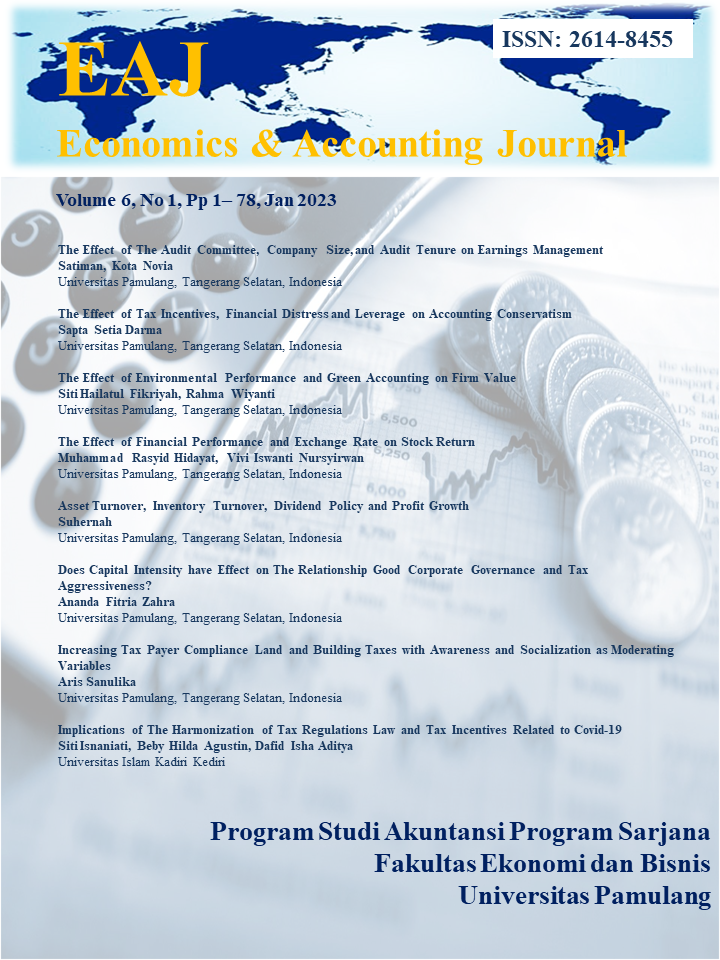The Effect of Tax Incentives, Financial Distress and Leverage on Accounting Conservatism
DOI:
https://doi.org/10.32493/eaj.v6i1.y2023.p9-18Keywords:
Keywords, Tax Incentive, , Financial distress, Leverage, Accounting conservatismAbstract
This study aims to provide empirical evidence of the effects of Tax Incentives, Financial Distress, and Leverage on Accounting Conservatism. This type of research is quantitative. The population in this study is manufacturing companies listed on the Indonesia Stock Exchange (IDX) from 2017-2021. The sample used in this study took 175 data from 35 manufacturing companies listed on the Indonesia Stock Exchange. The data analysis technique in this study used the classical assumption test, multiple linear regression analysis, and hypothesis testing with the help of the Statistical Package For Social Sciences (SPSS) version 22 program. Based on the test result,s it was found that partially Financial Distress and leverage did not significantly affect Accounting Conservatism. In contrast, tax incentives had a significant influence on Accounting Conservatism. Simultaneously Tax Incentives, Financial Distress and Leverage affect Accounting Conservatism. The research findings provide practitioners, internal (managers and business owners, both local and multinational organizations), and external (policymakers, foreign investors) new insights into applying conservative accounting policies, which are influenced by various factors.References
Agustina Rice Stephen, 2015. “Analisis Faktor-faktor yang mempengaruhi penerapan Konservatisme Akuntansi pada perusahaan manukfatur yang terdaftar di Bursa Efek Indonesiaâ€, Simposium Nasional Akuntansi 18 Universitas Sumatera Utara. September:16-19
Amelia Sary Handayani, Yeasy Darmayanti, Mukhlizul Hamdi, 2016. “Pengaruh Insentif Pajak dan Faktor-faktor non pajak terhadap Konservatisme Akuntansi pada perusahaan manufaktur terdafatar di BEâ€.. Universitas Bung Hatta
Danang, Sunyoto, “Metodologi Penelitian Akuntansiâ€, Bandung: PT Refika Aditama Anggota Ikapi, 2013
Desy Afriana, “Pengaruh faktor-faktor koservatisme akuntansi dalam perpajakan pada perusahaan food and beverages yang terdaftar di bursa efek Indonesiaâ€, Universitas Pembangunan Nasional, 2013
Dinny Prastiwi Brillianti, “Pengaruh kepemilikan manajerial, kepemilikan institusional, leverage dan komite audit terhadap konservatisme akuntansiâ€, Universitas Negeri Semarang, 2013
Ghozali, Imam, “Aplikasi Analisis Multivariate Dengan Program IBM SPSS 25â€, Cetakan kesembilan, Semarang: Undip, 2018.
Harahap, Sofyan syafri, “Analisis kritis Atas laporan keuanganâ€, Cetakan Kesebelas, Penerbit Rajawali Pers, Jakarta. 2013.
Hery, “Teori Akuntansiâ€, Jakarta: Kencana Prenada Media Group 2011
Hestin Tunjung Sari, “Pengaruh insentif pajak terhadap koservatisme akuntansi dengan tax planning sebagai variabel moderasiâ€, Tangerang: Fakultas Ekonomi Universitas Pamulang, 2016.
Hesty Setyaningsih,â€Pengaruh tingkat kesulitan keungan perusahaan terhadap konservatisme akuntansiâ€, Universitas Muhammadiyah Yogyakarta, 2008
Kasmir, “Analisis Laporan Keuanganâ€, Jakarta: PT. Raja Grafindo Persada, 2011.
Kiki Marselah, 2017. Pengaruh Financial Distress, Ukuran Perusahaan dan Leverage terhadap Konservatisme Akuntansi. Universitas Pasundan.
Kuntjojo, “Metodologi Penelitianâ€, Kediri: Universitas Nusantara PGRI, Yograkarta: Graha Ilmu, 2009.
Lubis, Arfan Ikhsan, “Akuntansi Keperilakuanâ€, Edisi 2, Jakarta: Salemba Empat, 2010.
Mardiasmo, “Perpajakan†Edisi Terbaru, Penerbit Andi, Yogyakarta: Andi Offset, 2016.
Mery Apriani, “Faktor-faktor yang mempengaruhi konservatisme akuntansi pada perusahaan manufaktur yang terdaftar di BEIâ€, Jom FEKON Vol, 2, 2015
Mifta Quljanah dkk, “Pengaruh growth opportunity dan leverage terhadap konservatisme akuntansiâ€, Universitas PGRI Madiun, 2017
Muhammad Arish Munajat, “Pengaruh Leverage dan financial distress terhadap konservatisme akuntansiâ€, Universitas Pendidikan Indonesia 2015
Ni Kd Sri Lestari Dewi dan I Ketut Suryana, “Pengaruh kepemilikan manejerial, leverage, dan financial distress terhadap konservatisme akuntansiâ€, Universitas Udayana, 2014
Putri Rahayu, “Pengaruh insentifa pajak terhadap praktik manajemen dengan prinsip konservatisme akuntansi,†Falkutas Ekonomi UIN Maliki Malang, 2014
Pohan,Chairul Anwar, “Manajemen perpajakan. Strategi perencanaan pajak dan bisnisâ€, Jakarta: Gramedia Pustaka Utama, 2016.
Raharja, N. dan Amelia Sandra, 2014. Pengaruh Insentif pajak dan faktor non pajak terhadap konservatisme akuntansi manufaktur terdaftar di bursa efek Indonesia. Prosiding Simposium Nasional Perpajakan 4
Resti, 2012. Analisis Faktor-faktor yang Mempengaruhi Konservatisme Akuntansi (Studi pada Perusahaan Manufaktur yang Terdaftar di Bursa Efek Indonesia Tahun 2008-2010). Skripsi. Makassar: Universitas Hasanudin
Safril Aris, “Pengaruh insentif pajak,tingkat hutang, dan ukuran perusahaan terhadap konservatisme akuntansiâ€, Universitas Mercu Buana Jakarta, 2016
Savitri, “Konservatisme Akuntansi†Yogyakarta: Pustaka Saliha Yogyakarta, 2016
Sugiono, “Metode Penelitian Kuantitatif, Kualitatif dan R & Dâ€, Bandung: Alfabeta, 2014.
Verawaty dkk, “Insentif pemerintah (Tax Icentives) dan faktor non pajak terhadap konservatisme akuntansi perusahaan perbankan di Indonesiaâ€. Universitas Guna Darma, 2015
Waluyo, “Perpajakan Indonesiaâ€, Jakarta: Salemba empat, 2017 Edisi 12
Wijoyo, Nugroho, “Menakar kinerja perusahaan pembiayaanâ€, Jakarta: Salemba empat, 2016
Windra,W.S. 2012. “Uji Empiris Pengaruh Faktor-faktor Konservatisme Akuntansi dalam Perpajakanâ€. Skripsi
Wiratna, Sujarweni, “ SPSS Untuk Penelitianâ€, Yogyakarta: Pustaka Baru Press, 2015.
www.tribunnews.com
www.pajak.go.id
www.idx.co.id
Published
Issue
Section
License
Copyright (c) 2024 Sapta Setia Darma

This work is licensed under a Creative Commons Attribution-NonCommercial-ShareAlike 4.0 International License.
Authors who publish with this journal agree to the following terms:
- Authors retain copyright and grant the journal right of first publication with the work simultaneously licensed under a Creative Commons Attribution License that allows others to share the work with an acknowledgement of the work's authorship and initial publication in this journal.
- Authors are able to enter into separate, additional contractual arrangements for the non-exclusive distribution of the journal's published version of the work (e.g., post it to an institutional repository or publish it in a book), with an acknowledgement of its initial publication in this journal.
- Authors are permitted and encouraged to post their work online (e.g., in institutional repositories or on their website) prior to and during the submission process, as it can lead to productive exchanges, as well as earlier and greater citation of published work (See The Effect of Open Access).

This work is licensed under a Creative Commons Attribution-ShareAlike 4.0 International License.


